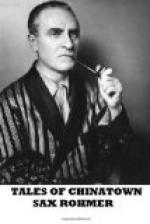From the moment when he began to speak again until that when I rose and followed him from Malay Jack’s, as I shall presently relate, I became oblivious of my surroundings. I lived and moved through those last fevered hours in the lives of Dr. Kreener, Tcheriapin, the violinist, and that other tragic figure around whom the story centred. I append:
THE STRANGER’S STORY
I asked you (said the man in the caped coat) if you had ever seen Tcheriapin, and you replied that you had once heard him play. Having once heard him play you will not have forgotten him. At that time, although war still raged, all musical London was asking where he had come from and to what nation he belonged. Then when he disappeared it was variously reported, you will recall, that he had been shot as a spy and that he had escaped from England and was serving with the Austrian army. As to his parentage I can enlighten you in a measure. He was a Eurasian. His father was an aristocratic Chinaman, and his mother a Polish ballet-dancer—that was his parentage; but I would scarcely hesitate to affirm that he came from Hell; and I shall presently show you that he has certainly returned there.
You remember the strange stories current about him. The cunning ones said that he had a clever press agent. This was true enough. One of the most prominent agents in London discovered him playing in a Paris cabaret. Two months later he was playing at the Queen’s Hall, and musical London lay at his feet.
He had something of the personality of Paganini, as you remember, except that he was a smaller man; long, gaunt, yellowish hands and the face of a haggard Mephistopheles. The critics quarrelled about him, as critics only quarrel about real genius, and while one school proclaimed that Tcheriapin had discovered an entirely new technique, a revolutionary system of violin playing, another school was equally positive in declaring that he could not play at all, that he was a mountebank, a trickster, whose proper place was in a variety theatre.
There were stories, too, that were never published—not only about Tcheriapin, but concerning the Strad, upon which he played. If all this atmosphere of mystery which surrounded the man had truly been the work of a press agent, then the agent must have been as great a genius as his client. But I can assure you that the stories concerning Tcheriapin, true and absurd alike, were not inspired for business purposes; they grew up around him like fungi.
I can see him now, a lean, almost emaciated figure with slow, sinuous movements and a trick of glancing sideways with those dark, unfathomable, slightly oblique eyes. He could take up his bow in such a way as to create an atmosphere of electrical suspense.
He was loathsome, yet fascinating. One’s mental attitude toward him was one of defence, of being tensely on guard. Then he would play.




